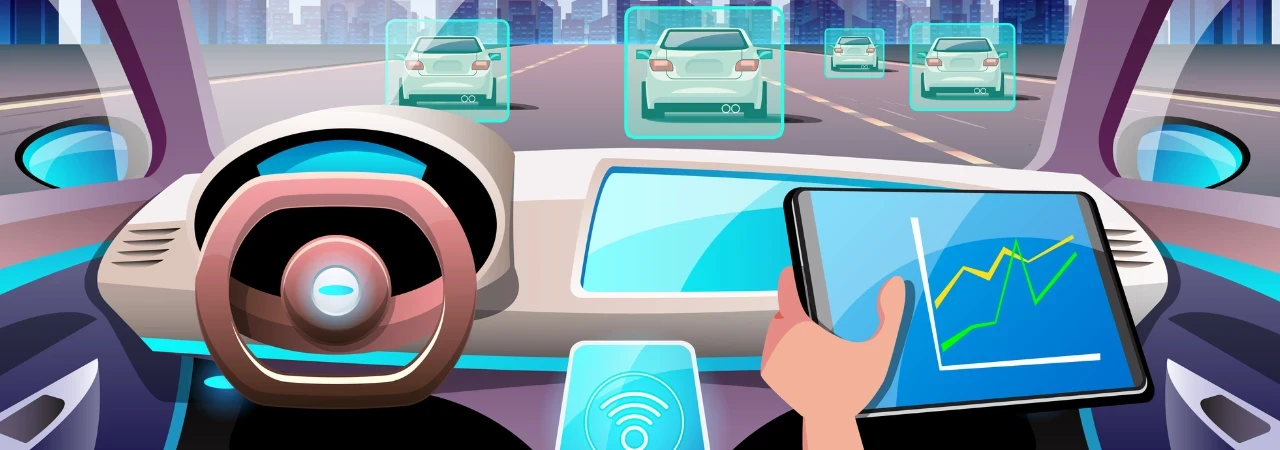
Let us move to technology and its role in modernizing transportation. There are not many avenues that digital technology has not touched. Of late, digitization has been busy automating a lot of boring and mundane activities for us. Driving is a harrowing experience accelerated by the fact that many drivers do not stick to traffic rules.
Not many would want to drive around the city these days. With roads choc-a-block with never-ending rows of automobiles, there is not much reason left why many of us would still want to drive. Digital assistants are now speaking assistants that can book even a Uber ride or a pizza for the busy officegoer. Can things get any better? Well, technology says it can – certainly in the case of cars.
The connected car:
The word “connected car” sounds like it can mean a lot of things. What it actually means is that the car is connected to many devices inside, which are in turn connected with each other or with devices outside through the internet. A connected car is, therefore, a larger device that uses mini-gadgets and intelligent applications to connect to the external world. In other words, they receive and send out data in order to achieve a certain set of objectives. The car becomes a digital assistant or companion of sorts.
So, what do connected cars do?
The answer is a lot of things. These cars are intelligent, true to their names, which means they can analyze and give effective outcomes. The vehicles can also communicate with other cars using internal devices.
Other benefits:
1) Passenger safety:
The US Department of Transportation’s National Highway Traffic Safety Administration (NHTSA) conducted a significant study on auto accident causes. According to its National Motor Vehicle Crash Causation Survey, which examined 5470 crashes, 94% were estimated to be attributable to drivers. In essence, people drive, therefore traffic accidents happen.
Connected cars can notify drivers in case they are veering dangerously towards another vehicle or obstacle. This prevents accidents or collisions due to careless driving and other such reasons. In the event of an accident, the cars also let an emergency service know immediately. With help from smart devices, these cars can also keep a tab on safe driving practices and inform relevant sources at the right time. Devices that help parents keep track of their teen-age children driving at safe speeds are an example.
2) In-car entertainment:
Connected cars have access to various digital sources outside, with which a variety of content can be downloaded. The car can learn the user’s preferences in music and entertainment and play accordingly.
3) Car diagnostics:
Connected cars follow important engine parameters as well as maintenance requirements and notify the driver. Fuel and fluid levels are also monitored by internal devices.
4) Insurance claims:
Smart cars let insurance companies know immediately in the event of an accident. This makes it possible for them to access relevant data at the right time, confirm the incident, and interact with the policy owner accordingly.
5) Connectivity to everything:
True to its name, connected cars are enabled to communicate with any device internally or externally. This means that the passengers or drivers can interact with anything that is connected to the internet. The driver can be constantly connected to his home, loved ones, or office colleagues. Voice-activated digital assistants can speak to passengers, answering questions, and providing reminders.
6) Convenience:
Intelligent cars can find out empty parking lots, gather information about traffic situations, give directions on the route, and more. Passengers can use their time productively by attending calls, listening to podcasts, participating in discussions, or sending important messages via email or chat.
Outcome:
Connected cars are not really a new buzzword, completely autonomous cars being a more futuristic goal. However, there is little doubt that connected cars are a very obvious face of innovation. More automobile manufacturers are moving to technology that aids enhanced vehicle connectedness. Technology giants such as Google and Apple have been prompt with their car communication systems, enabling users to use relevant apps from both the stores.
Concerns:
Security of connected cars will be a huge concern, given the number of hackers and cybercriminals and the volume of related incidents. Keyless entry, data stealing, and taking over of cars have been reported already. Another concern is whether the dependence on smart vehicles will make users more careless and thereby cause more accidents in the future.
Final note:
Connected cars will ultimately make life a lot more bearable for drivers and passengers. The focus will be on better utilization of time and human effort, by automating repetitive and mundane tasks associated with it. Completely autonomous cars that drive themselves will be the next step or is already on its way. The future is good.

